Finally, some original content!!!
On Friday, you'll be hearing all about photographer Rebecca Andrews, but today I am absolutely delighted to be posting an interview I conducted by email with the author of Strong and Hard Women, a book FMS reviewed back in May, Dr Tanya Bunsell of St Mary's University College.
First, a little bio.
Tanya Bunsell is originally from High Wycombe in Buckinghamshire, England.
She has been teaching Sociology since completing her PGCE at Oxford Brookes University in 2003. She holds a BSc in Sociology from the University of Southampton, a post-graduate diploma in Social Research Methods from Portsmouth University, and a PhD in Sociology from the University of Kent.
Her PhD research, which she began in 2007, was completed in 2010, and looked at 'the lived experiences of British female bodybuilders'. It is this research work that ultimately led to her book.
FMS: You mentioned in an email that you were interested in muscle from the age of 7(!) What was it that stimulated that interest?
TB: Yes, that’s correct. The first time I saw a female bodybuilder I was 7 (at a ballet class). I looked up and saw a woman doing a gymnastic routine on a muted television screen. I watched her do the splits, one armed press-ups and even a back flip. I was awestruck, not so much by the routine, but by the combination of her skills and her appearance. I had never seen a woman look like that before. She was wearing a shiny bikini, displaying her tanned, muscular body. She had lots of make-up on and styled 'big' hair. She looked so happy, independent, strong and carefree. I know now that the woman performing the routine was a fitness competitor. Unlike the majority of people who immediately react with repulsion at the mere sight of a muscular woman, her appearance, demeanour and capabilities immediately appealed to me. Even at that young age I was drawn to and fascinated by a woman so apparently possessed of herself.
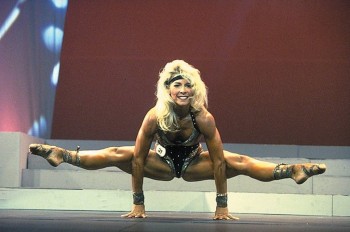
As a younger child I had always been a bit of a tomboy – running around with the boys, playing football and climbing trees. I had a competitive/perfectionist edge too and I guess I always felt girl's activities to be less interesting and more restricting than boy's. Looking back, perhaps the capabilities and look of the female competitor appealed to me as it seemed to combine both worlds – both the masculine and feminine identity.
FMS: How did your interest manifest itself – you didn’t start training at 7, did you? When did you start training seriously?
TB: My interest in weight training began around my 15th birthday, when I asked for a set of dumbbells. The following year on my 16th birthday I was given membership of a local gym. I remember the feelings of excitement and anticipation as I entered this underground gym – dimmed lights and loud music reminiscent of a night club atmosphere. It became my home, my refuge, my release. I embraced the endorphin highs and enjoyed the workouts, which consisted of variety of activities such as cardiovascular machines, running, aerobics, boxercise and circuits, as well as resistance weights and limited free weights exercises. It was not until I left college at 18 and became a full-time, qualified gym instructor that I became more involved in weight-training rather than 'keep-fit', encouraged by two women who regularly trained with weights. I loved how I felt in the gym, both the atmosphere and the experience of the workouts themselves. I also wanted to embody traits of power, independence and a controversial beauty.
FMS: You were 18 when you had a serious injury. You broke your neck doing 100kg squats and couldn’t do any heavy lifting again until 27. Did that scupper any ambitions you had of maybe becoming a competitive bodybuilder? Was that the ambition at the time of the injury? Do you think you would have gone in the same direction if you hadn’t had the injury?
TB: Very good question! In all honesty competition never appealed to me when I was younger. Partly because I am not a strong fan of competition in any form (except against myself) and also because of the vanity side of it. Both of these aspects being influenced by my religious parents and my political/socialist views at the time. My views did develop/change as I began researching FBBs at 27, and I did consider competing in bodyfitness at one point purely for the experience. But really, for myself, I have reservations about being judged purely on my physical appearance. But that is a personal thing.
Until I began my research at 27, competitions were something of an enigma to me (as I think they may generally be to 'outsiders' of the sport). I always understood the passion to build muscle and strength (and be defined/vascular etc.), but when I was younger I had no desire to stand on stage and be judged by others in a bikini.
Interestingly, some of my female bodybuilder interviewees claim it is the lifestyle which makes one a true female bodybuilder, whilst others argued that unless you have been through the gruelling pre-comp diet and captured your peak physique on stage you can’t claim the identity of a female bodybuilder. I’ve digressed a bit here – it’s difficult to know whether I would ever have competed. If I had met my key informant (very close friend!) earlier in life and not had the injury then perhaps I would have... At times I do regret not having competed in a figure competition – but I was always waiting for my legs to improve!
FMS: At what point did you decide to make the study of female bodybuilding and female bodybuilders into an academic career? Why have you tended to focus on female bodybuilding rather than bodybuilding in general?
TB: In some ways this is difficult to answer as there are always a myriad of reasons as to why a person ends up researching a particular area (e.g. personal biography, access, funding, supervisor, interest etc.) but I’ll try to keep this short. My fascination with health and fitness (I used to be a personal trainer) combined with my love of sociology (which makes me question social norms) drew me to study female bodybuilders at undergraduate level for my dissertation thesis. Several years later I achieved a scholarship which enabled me to research the subject in depth.
However, my interest in female bodybuilding (as mentioned earlier) was always there. I have never understood (although I can of course give social explanations) as to why people generally have just a strong negative reaction to female bodybuilders – that of disgust, threat and repulsion. This is perhaps my most pivotal reason for studying muscular women rather than muscular men – as they appear to go against gender norms as to what a woman should look and act like.
FMS: Were there any other sociologists in the same field who inspired you?
TB: When I was doing my undergraduate dissertation, there was very little written on female bodybuilders. However, I was interested in Susan Bordo's argument that female bodybuilding laid on the same axis as anorexia, compared to S. Tate's argument that female weight-trainers sculpted their bodies to their own desires. More recently, scholars who bodybuild themselves such as Joanna Freuh, Anne Bolin and Leslie Heywood have made a significant contribution to the literature.... I could go on forever here! What has been missing however is a detailed ethnography capturing the lives of female bodybuilders (particularly in the UK where there is a dearth of research on muscular women).

FMS: How did the idea for this book come about?
TB: As you know the book was based upon my PhD thesis but adapted into a book, updated and a few extra chapters added, for example 'The Dark Side' [which concerns steroid use and muscle worship]. I was actually asked to write it by a famous sociologist/criminologist, Professor Dick Hobbs, who was randomly on my panel at my job interview at St Mary’s.
FMS: The book's full title is 'Strong and Hard Women: An Ethnography of Female Bodybuilding'. Can you explain for us exactly what an ‘ethnography’ is?
TB: In plain English, ethnography is an in-depth case study, which involves immersion within the culture or subculture under study. It often entails observation (participant and/or non-participant) and in-depth interviews.
FMS: You mentioned to me that for the book you spent time training with female bodybuilders on a daily basis. How hard was that?!
TB: During the period of the study I immersed myself in the daily routines of this lifestyle by training, dieting and interacting with female bodybuilders. While I did not regard myself as a bodybuilder, I became sufficiently strong enough for these women to take me seriously when working out with them, while not being so visibly muscular that I was unable to pass as an 'ordinary user' to other gym members and to those friends and family members of female bodybuilders that I interviewed. My willingness to engage in long hours of serious weight-training (an activity considered unfeminine and deviant by gender norms) also helped convince the female bodybuilders that I spoke to that I was sympathetic and serious in wanting to understand their activities and commitments.
Being a woman also made it easier for me to raise and discuss intimate issues with them - ranging from unwanted body hair to sexual relationships. Gaining this degree of immersion involved me in the following practicalities: getting up at 5am to train for several hours with female bodybuilders, learning new body techniques and exercises (including the use of training equipment such as wraps, belts and chalk), going to competitions, waking up aching every day, eating protein every two hours, taking supplements such as creatine, glutamine, tribulus, zinc and essential fatty acids, as well as spending a vast quantity of time talking about bodybuilding, reading magazines, participating in online bodybuilding forums, watching DVDs and building friendships with female and male bodybuilders.
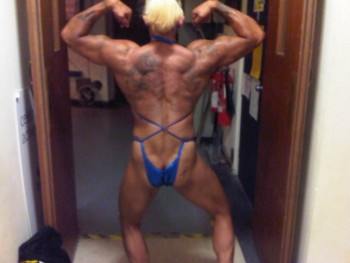
The first year of my PhD was one of the best years of my life. I couldn’t believe I was getting paid to research female bodybuilders. I felt extremely privileged. On the down side, I kept getting injury niggles and hated training first thing – however, that’s hardly a price to pay for getting to study such an interesting issue! Although that makes it sound as though it was just an academic process! I made some really close friends during the research and I loved hanging around with them.
FMS: What did you learn from that experience that you couldn't have got from second-hand accounts or interviews?
TB: For me, it was important that I built trust and rapport with these women by demonstrating my willingness to participate. Secondly, bodybuilding is an intense corporeal affair, I felt it was vital to understand both the processes of building muscles and daily lived experiences of female bodybuilders (both the pleasures and the pains) in order to get more of an insight into their motivations and embodiment. Lastly, the study was also about becoming, being, and having a muscular female body - and I guess I was at the start of this journey! By participating, I not only became more immersed in the subculture but became aware of 'normals' reactions to me as I became more muscular.
FMS: I'm interested in what kind of difficulties you faced with your research into 'The Dark Side…'? For example, is it more difficult to get the women to talk about steroids or muscle worship?
TB: As a sports sociologist and gym enthusiast, I have always found men are quite open about what steroids and other PEDs they take. However, for females there is much more taboo due to the masculising effects of the drugs. It therefore, unsurprisingly, can take females more time before they are willing to confide about what they take and how it affects them personally. I do think though, that women are becoming increasingly more open about the topic - partially due to internet forums (although of course many still retain their anonymity).
Muscle worship, however, is still shrouded in a lot of secrecy and is very difficult to find out about. Indeed, there are no coherent, empirical studies/research out there on the topic. It appears that 'muscle worship' is even more deviant and almost impossible to find out about, which might seem slightly ironic given that it takes a matter of seconds to locate a muscle worship website on the internet and in the light of the press/media response that is already out there on the topic.
FMS: Why do you think that is?
TB: Good question. I can only make suggestions here: 1. Legal issues – sex work – (especially some states in America). There is always stigma around any form of sex work – whatever it may entail; 2. The fact the FBBs themselves are divided on the issue. Obviously I want to caution here about making any grand generalisations. Muscle worship, as you know, encompasses a whole range of activities/preferences/view points – from those (mainly men) who simply appreciate female muscle to those who pay for sessions (and then of course sessions vary vastly).
FMS: How are muscle worshippers viewed by the women themselves? An annoyance? A necessary evil? A blessing?!
[To answer this, Tanya has very kindly allowed an extract from the book to be used.]
Views from the women
Despite the burgeoning trade of muscle worship, very little is known about how female bodybuilders experience these events. Do they participate in these sessions purely for money or are their other motivations and pleasures to be found? The community of female bodybuilders are divided on this topic between those who believe it is debasing and damaging to the sport, those who believe that it is a legitimate way to make a living due to the limited opportunities available to them in the sport and those who engage in sessions for individual pleasure and sexual satisfaction. Charlie (female bodybuilder of 4 years) points out that due to the high financial costs of female bodybuilders' lifestyles, it is difficult to survive without supplementing their income with muscle worship, she claims even 'the pros can't really have a regular job... the male bodybuilders also do it but that’s even more taboo'. Although female participants claim that a 'high proportion of female bodybuilders do it', it is impossible to find out numbers due the secrecy of any form of sex work.
Some female bodybuilders are horrified by the commercialisation of female muscle and the financial transactions of muscle worship. Barbara (bodybuilder of 7 years) states 'I just think it’s disgusting, it's bad for the sport, it's no different to prostitution really'. A leading figure in the world of female bodybuilding and UK judge has also spoken out against these sessions, arguing that it is 'degrading to the women and brings the sport into disrepute'.
However, Lisa Cross (winner of the UKBFF 2010) retaliates: 'Some people argue that it’s bringing bodybuilding into disrepute. As far as I'm concerned, it's putting bodybuilding on a pedestal, making it available to people who would never consider attending an actual show. It's a huge industry in the US, and it allows me to spend 99 per cent of my time totally focussed on my career. The federation would probably have less of a problem with it if they were making money from it themselves.' (quoted in The Telegraph newspaper, Cyrus Shahrad, 09/08/2012).
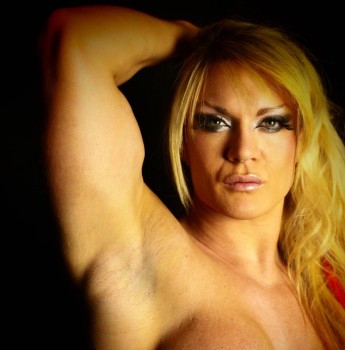
Another female bodybuilder (Danielle, a bodybuilder of 5 years), stated that she 'did it for cash pure and simple'. Rather than the women being coerced in any way there is a suggestion of choice and free will and feelings of being in control: 'We get £210 for muscle worship, compared to the regular girls who only get £100 (£40 taken for commission) and have to sleep with them... Depends on the client and what we decide... it leaves the ball in our court. There’s no pressure to do what we don’t want to do... There’s really no assumptions there, which surprised me at first because of the way things are portrayed – the hard core muscle worshippers are simply that - hard core worship fans... some want the 'girlfriend experience', others just want you to flex, sometimes there’s no sexual stuff at all. It’s really up to the woman herself and what she wants to do.'
Thus the female bodybuilders have agency and are not passive dupes but are complicit in the performances. In addition to the financial incentives, for some female bodybuilders, there was pleasure to be found in both the recognition of their hard work and the dedication that it had taken to create their physique, and the worshipper's admiration: 'If someone wants to make money out of something for what they've done, and what they've achieved – then why not? You spend so long being slated for what you do and having to put up with negative press… And then someone comes along and offers you £200 to say how fantastic you are for an hour - then who's going to turn that down? Regardless of what they do?... I just think that if you can make money out of it and provide a stable financial way of living and stuff…then I don't think that's a bad thing... for people to tell me I'm great.' (Mary bodybuilder of 12 years).
As Erin (female bodybuilder of 7 years) articulates, 'Every human being appreciates and desires recognition for something and thoroughly enjoys having the opportunity to feel sexy and wanted. If a female bodybuilder gets that from her muscles, how is it wrong or different from other women being desired for their chest size or pretty face?' Thus in the light of the negative reactions female bodybuilders often contend with, muscle worship may affirm their identity as sensual and feminine.
For some women, muscle worship is not about financial reward at all, but about a mutual and sexual appreciation of her physique and individual empowerment. For example, Nathalie Gassell articulates her sexual desire to be worshipped and submitted to for her own pleasure: 'But back to my muscles, to that capacity to dominate and enslave a body for my pleasure and yours, to that seizure, the consumption of another's flesh, willing, sacrificed on the altar of my thirst. I gently caress his slender body and then, when he asks for it, I become brutal. His delicacy is striking and beautiful beneath my hands. His body lays belly down, and I lay on top without any fighting; a motionless test of strength – where our bulks come face to face with their differences in thickness, in muscle tone, in power - suffices to make my body, concretely in its own flesh, the guiding element of our encounter. Our minds are impregnated with these differences. He is consenting. If my body were not the stronger, I could not be pleased. I could not get any carnal pleasure (cited in Frueh, Fierstein and Stein, 2000, p118-119).
Thus on one hand, the 'deviant' female body is being fetishized and erotised by men, on the other, the female bodybuilder is active and seeking individual pleasure.
Other female bodybuilders have also expressed their desire to revel with admirers in their own muscular glory. An American female bodybuilder, who participated in muscle worship sessions with partners/potential partners purely for enjoyment believes that 'for the female bodybuilder, it can most certainly be an empowering and equally sexual experience'. She expands upon this in the following quote: 'Even aside the sexual high, other thrills are just knowing how turned on your body is making somebody else, having your body and your muscles appreciated for what they are, being the one who is in control and has the power over the other person. Thus for my sessions, most of them have been incredibly sexual, both as an intense form of foreplay before more happened, and also where the worship has been the sex, or taken the place of actual sex... it's often times a more intense sexual experience than the actual sex itself.'
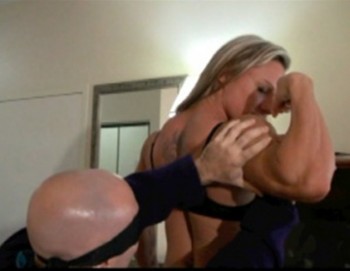
Empowerment is found through both the power to sexually excite and in the physical knowledge that she is in control: 'I had always been physically larger and stronger than the guys I had dated. Therefore it was empowering in the literal sense in just knowing that if I wanted to, I could literally pick this guy up and throw him around, or I could have my way with him and he wouldn't be able to resist. It is also empowering on the mental sense in that knowing how aroused these got over female muscle, I could make them do what I wanted simply by withholding from them what they really craved' (Erin, bodybuilder of 7 years).
FMS: Last year, Female Muscle Slave helped you appeal for help with your research into us fans. I know you didn’t manage to get a lot of responses, but there were some. Did anything about us surprise you? What can you tell us about ourselves? You also call for more research into the muscle worshippers, what kinds of things do you think would be useful to find out?
TB: As hegemonic and hypermasculinity consist of traits such as dominance, power, strength, independence and muscularity, perhaps it is unsurprising that males who have been attracted to deviant muscular female bodies have been depicted in a negative light. Stereotypical muscle worshippers have been portrayed in documentaries such as Louis Theroux’s Weird Weekend as weedy, nerdy, pathetic, 'living with their mothers at 40 and saving every penny for sessions', being repressed homosexuals, having no social skills and as having something mentally defective about them. So far, no comprehensive study has taken place which interrogates this common knowledge – it was for this reason that I contacted you with the intention of learning more about males who appreciate female muscle. And I am very grateful for all your help and to those who did respond!
[Again, the following is an extract from Tanya's book.]
Who are these people?
It is extremely difficult to establish how many muscle worshippers there are. One of the biggest worldwide forums has almost 20,000 members, although there must be far more who do not subscribe or actively participate. A UK blog such as Femalemuscleslave [hey, that's me!] can receive up to 200 visits from the UK a day. In Kaye’s (2005) book, Mary claims that there is no single type of muscle worshipper, that they are of all ages (20 through to 80 years old), ethnicities, classes and appearances.
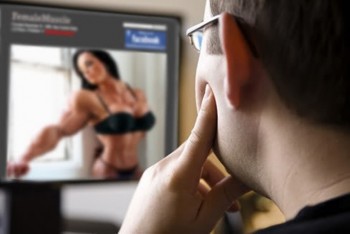
Despite huge methodological issues, my research in the UK found that the majority of muscle worshippers were middle-class, university educated, were aged between their late 20s and late 40s. The majority were heterosexual and were active gym members. That several weight-trained is perhaps surprising and contradicts with other scholarly works, such as Chare (2012:207) and Richardson (2008:296). These academic commentators claims that schmoes may deliberately 'cultivate flabbiness or lankiness, perfecting a feeble physique incapable of lifting heavy weights... [in order to] better the contrast their bodies with the images of the powerful figures of female bodybuilding’. However, according to '6ft1Swell' [hey, me again!!!]: 'I'm not surprised you have found that many of us in the sample do train, as I think this is connected. Wisdom among the brethren (the more mature ones anyway) is that training yourself is the best way to arouse your partner's interest in training, or at least getting into the gym for some kind of physical activity.'
These demographics clearly give a counter-presentation of the stereotypes of muscle worshippers as weak and economically dependent.
A common thread between the muscle worshippers is that their attraction to muscular women developed in their teens:
'My interest in FBBs began with seeing muscle magazines in my teens, I had an immediate fascination with women like Lenda Murray and Kim Chizevsky. By my late teens and early 20s my access to the internet was daily and so I was able to access a lot more online, and my interest increased as a result.' (Kiyone)


'I was young when I first saw a slot on news where a bodybuilder appeared, a male, then I started like watching athletes…When I was a teenager I started buying bodybuilding magazines, but as time went on female bodybuilders became less common in the magazines, but the magazine WPW was available in some places.' (Aiden) [hey, I know that guy!]
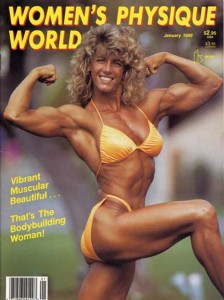

'I'm not sure how it all got started exactly but like many I grew up with American Comic books with some strong sexy female superhero characters... Way back maybe late 70s, early 80s , there was a bookshop in London’s Charing Cross Road, near where the Cass Arts shop is now, which had what I now realise to have been early editions of the Women's Physique Publication and possibly Women's Physique World Mag... Well. feeling self-conscious about doing so, I used to quickly try to browse them, but I was too embarrassed I think to actually take one to the counter to buy, the guy at the counter was usually always talking to another staff member and I kept thinking that they would say something like "you don't like this stuff do you?"' (Patrick) [my female muscle blog hero!]
Whilst muscle worshippers often stated that they did find 'normal' women attractive in terms of personality, all distinctly expressed their preference for a muscular physique and not the 'glamour norm of thin with large breasts' (Aiden), thus subverting the hegemonic norms of desire. For the fans, muscle symbolises power, strength, independence and vitality, and creates a visceral effect which is difficult to capture in words. The women take on almost super heroine qualities.
As Kiyone explains: 'To me muscle represents power, strength and confidence, aside from how much I like the look. There's a primal aspect to it I find very appealing. It is hard sometimes to verbalise what I like about muscle though.'
Traditionally eroticism has been critiqued by feminists, as often being about masculine dominance and power over the female. In the words of Bologh (1990:204) it becomes 'a patriarchal arrangement in which the stronger party accepts and expects the devotion of the weaker'. However, muscle worshippers often wish to be overpowered by the female bodybuilder. They are in awe of these muscular goddesses and wish to celebrate her muscles, her strength and power – thus transgressing traditional gender roles. As the woman becomes hard, tough, unbending and powerful, the man becomes weak, passive and subservient. The popular fantasy of the muscular dominatrix puts her in control; the worshippers are reduced to slaves and must submit under her powerful influence. Whilst this is a pervasive argument, Chare's argument is worth noting here, that despite 'gender bending/gender trouble', there still exists an 'exultation' of hardness or muscularity and strength. The male muscle worshipper desires the women to be hard, with low body fat, vascular and in competition state. Softness and fluidity associated with feminine traits are pronounced as weak, whereas traditional masculine traits of hardness and strength are heralded as superior.
FMS: You also call for more research into the muscle worshippers, what kinds of things do you think would be useful to find out?
TB: Yes, whilst I think this study is a start in the right direction – it is only that (my sample size was far too small to make any generalisations). Far more research needs to be conducted in this area – both from the women's perspectives themselves (including the lived embodied experiences of the actual sessions) and from the perspective of the muscle worshippers. Indeed, I actually feel that the male muscle worshippers voice has been severely neglected in research on female bodybuilders (including my own) and I would like to see more work out there that begins to break down these taboos and stigmas and celebrates men who celebrate muscular women in all their complex beauty.
FMS: Any idea what might be the next Tanya Bunsell study? Given unlimited resources, what would you turn your attention to next?
TB: I have several areas of interest on the go at the moment, but the one which is perhaps most related to female bodybuilding I NEED TO KEEP QUIET IN CASE SOME ACADEMIC STEALS THE IDEA ;-)
'Strong and Hard Women' is available from Amazon
Excellent post! I wish I had money to buy the book. Perhaps one day I will...
ReplyDeleteYou should have asked her to ask some FBB's how they feel about FBB contests being cancelled and replaced by fitness bikini contests and how that will effect the sport in the short and long term.
I'd love to read that book, looks very interesting!
ReplyDeleteHopefully there will be some news regarding a paperback edition of the book in the near future. I can't imagine anyone interested in FBBs not being fascinated by it, so it would be a shame if the potential readership is never fully realised.
ReplyDeleteWhat determined the price of the book?
ReplyDeleteThe publisher, Routledge, I guess. It's one of a series called 'Advances in Ethnography' and all the books in the series are priced the same.
Delete